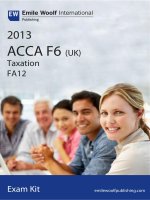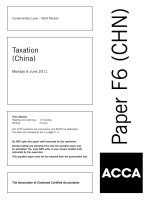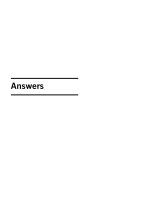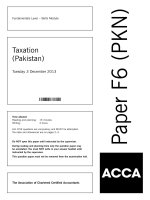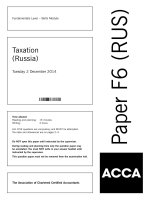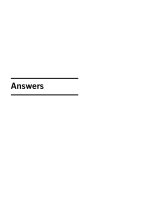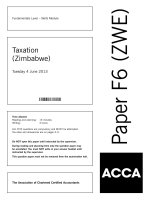ACCA f6 taxation south africa 2013 dec question
Bạn đang xem bản rút gọn của tài liệu. Xem và tải ngay bản đầy đủ của tài liệu tại đây (276.81 KB, 12 trang )
Taxation
(South Africa)
Tuesday 3 December 2013
Time allowed
Reading and planning:
Writing:
15 minutes
3 hours
ALL FIVE questions are compulsory and MUST be attempted.
Tax rates and allowances are on pages 2–4.
Do NOT open this paper until instructed by the supervisor.
During reading and planning time only the question paper may
be annotated. You must NOT write in your answer booklet until
instructed by the supervisor.
This question paper must not be removed from the examination hall.
The Association of Chartered Certified Accountants
Paper F6 (ZAF)
Fundamentals Level – Skills Module
SUPPLEMENTARY INSTRUCTIONS
1.
2.
3.
Calculations and workings need only be made to the nearest R.
All apportionments should be made to the nearest month.
All workings should be shown.
TAX RATES AND ALLOWANCES
The following tax rates and allowances are to be used in answering the questions.
Year ending 28 February 2013/31 March 2013
Rebates
Primary rebate
Secondary rebate (over 65)
Tertiary rebate (over 75)
R11,440
R6,390
R2,130
Interest exemption
Under 65
Over 65
R22,800
R33,000
Foreign dividend exemptions
Fully exempt where 10% or more of the equity shares and voting rights are held
Fully exempt where received by a company from a foreign company resident in the same country as the recipient
To the extent of any controlled foreign company inclusions (net of applicable foreign tax)
To the extent that the foreign dividend is from a company listed on the JSE
To the extent that the above do not apply
For individuals 25/40ths of the dividend is exempt
For companies 13/28ths of the divided is exempt
Medical rebate rates
Single member
Member plus one dependant
Each subsequent dependant
R230
R460
R154
Dividends tax
15%
Companies
Normal tax rate
28%
Official rate of interest (assumed)
8%
Rates of normal tax payable by persons (other than companies)
In respect of the year of assessment ended 28 February 2013
Where the taxable income
Does not exceed R160,000
exceeds R160,000 but does
exceeds R250,000 but does
exceeds R346,000 but does
exceeds R484,000 but does
exceeds R617,000
not
not
not
not
exceed
exceed
exceed
exceed
R250,000
R346,000
R484,000
R617,000
18% of each R1 of the taxable income
R28,800 plus 25% of the amount over R160,000
R51,300 plus 30% of the amount over R250,000
R80,100 plus 35% of the amount over R346,000
R128,400 plus 38% of the amount over R484,000
R178,940 plus 40% of the amount over R617,000
Tax rates for small business corporations
for the year of assessment ended 31 March 2013
R0 – R63,556
R63,557 – R350,000
R350,001 and above
Nil
7% of the amount over R63,556
R20,051 plus 28% of the amount over R350,000
2
Turnover tax rates for micro business corporations
for the year of assessment ended 31 March 2013
R0 – R150,000
R150,001 – R300,000
R300,001 – R500,000
R500,001 – R750,000
R750,001 – R1,000,000
Nil
1% of the amount over R150,000
R1,500 + 2% of the amount over R300,000
R5,500 + 4% of the amount over R500,000
R15,500 + 6% of the amount over R750,000
Car allowance
Maximum vehicle cost for actual expenses
R480,000
Fringe benefit (company car)
Benefit percentage (where no maintenance plan exists)
3·5%
Benefit percentage (where maintenance plan exists)
3·25%
General business reduction: Benefit value x business kms/total kms (as per logbook)
Private fuel reduction: Private fuel (R) x private kms/total kms (as per logbook)
Private maintenance reduction: Private maintenance (R) x private kms/total kms (as per logbook)
Subsistence allowances
Deemed expenditure for meals and incidental costs (per Government regulation) R303 per day (local travel)
Deemed expenditure for incidental costs only (per Government regulation) R93 per day (local travel)
Deemed expenditure for meals and incidental costs (foreign travel) – per published tables therefore supplied in
the question where relevant
Common capital allowances
New and unused manufacturing plant and equipment
Used or leased manufacturing plant and equipment
Small business corporation manufacturing plant and equipment
Small business corporation (other assets) – unless wear and tear
provides a greater deduction
40%/20%/20%/20%
20% each year for five tax years
100%
50%/30%/20%
Wear and tear (based on Binding General Ruling 7) will be supplied in the question where relevant
Manufacturing building allowance (unless seller’s rate supplied)
New or unused commercial building (not manufacturing building)
– No deduction where another section of the Act applies to the building
– Where part of a building is acquired, 55% of the acquisition price is ‘cost’
– Where an improvement to the building is acquired, 30% of the acquisition price
of the improvement is ‘cost’
Research and development (R&D) expenditure
Additional 50% on expenditure incurred if R&D project approved by the Minister of
Science and Technology and incurred for R&D after such approval
3
5%
5%
100%
[P.T.O.
Capital gains tax
Annual exclusion (while alive)
R30,000
Annual exclusion (in year of death)
R300,000
Primary residence exclusion
R2,000,000
(where proceeds are R2 million or less, the full gain is excluded for the portion of the property used for
domestic purposes as a primary residence)
Inclusion rate (natural persons)
33·3%
Inclusion rate (non-natural persons)
66·6%
(P – B) × N
Time apportioned base cost formula: Y = B +
(T + N)
P = R x B/(B + A)
Travel allowance table
for years of assessment commencing on or after 1 March 2012
Value of the vehicle (including value
added tax (VAT) but excluding
finance charges or interest)
R
0 – 60,000
60,001 – 120,000
120,001 – 180,000
180,001 – 240,000
240,001 – 300,000
300,001 – 360,000
360,001 – 420,000
420,001 – 480,000
Exceeds 480,000
Fixed cost
Fuel cost
Maintenance
cost
R p.a.
19,492
38,726
52,594
66,440
79,185
91,873
105,809
119,683
119,683
c/km
73·7
77·6
81·5
89·6
102·7
117·1
119·3
133·6
133·6
c/km
25·7
29·0
32·3
36·9
45·2
53·7
65·2
68·3
68·3
Note: Where reimbursement is based on actual business kilometres travelled and no other compensation is paid
to such employees and the kilometres travelled for business does not exceed 8,000, the prescribed rate is R3·16
per kilometre.
4
This is a blank page.
Question 1 begins on page 6.
5
[P.T.O.
ALL FIVE questions are compulsory and MUST be attempted
1
Established Tree Fellers Ltd (ETFL) is a company engaged in the felling, trimming, debarking and cutting into specific
lengths of the produce of tree plantations. The Commissioner for South African Revenue Service (SARS) accepts that
these activities are processes of manufacture for the purposes of the Income Tax Act. Also included in the service is
the grading of the ground after the trees are felled to prepare it for whatever purpose is required. The Commissioner
for SARS does not accept this activity as a process of manufacture for the purposes of the Income Tax Act.
ETFL is not classified as a small business corporation. The company is registered as a value added tax (VAT) vendor
but all amounts are stated excluding VAT, unless otherwise stated.
The following information relates to ETFL’s financial year ended 31 March 2013:
(i)
Fee income for the year amounted to R34,000,000, including R4,000,000 pertaining to progress payments
made by customers for on-going felling work. Not included in the R34,000,000 is R2,000,000 pertaining to
customer withholdings. Customers are entitled to withhold 10% of the contract value if damage is caused to
their property during the felling and grading processes. The 10% may only be withheld until the damage is
repaired at ETFL’s cost or it is proven that ETFL is not at fault. Of the R2,000,000, it is estimated that
R1,200,000 is payable as ETFL is not at fault. The remaining R800,000 will only be paid to ETFL when the
repairs have been completed at the customer’s premises; it is estimated that these repairs will cost ETFL
R650,000. None of the repairs have been done nor has it been proven yet that ETFL is not at fault in respect
of the R1,200,000.
(ii)
Tree felling can be dangerous work. During the year, a worker was killed when the rope rigging got caught in
the section cut and he was crushed in the fall. A junior rigger, who was responsible for setting up the ropes,
had not followed company protocol of having a senior rigger check the rigging. ETFL paid the worker’s family
compensation of R1,000,000. This matter was settled out of court.
(iii)
A debarking machine had to be replaced during the year. The original machine had been acquired new and
unused on 1 May 2010 for R1,500,000 and was sold for R1,800,000 on 1 August 2012, having been taken
out of use on 31 July 2012. The replacement machine was acquired new and unused at a cost of R2,500,000
on 15 July 2012 and brought into use from 1 August 2012.
(iv)
None of the other machines used by the company were replaced in the current year. These other machines
comprise the following:
1. Motorised chain saws (part of the felling process) with an original cost of R450,000 on 1 June 2011.
2. Graders (part of the grading process) with an original cost of R1,300,000 on 1 August 2009.
3. Mobile cranes (part of the felling process) with an original cost of R3,600,000 on 1 May 2008.
(v)
One of the mobile cranes had to be repaired at a cost of R300,000 on 1 November 2012. ETFL uses its own
workshop for repairs (see (vi) below). The parts required were taken from the stock of parts kept for this
purpose. The spare parts on hand at 1 April 2012 had a cost of R450,000 and at 31 March 2013 of
R150,000. The Commissioner for SARS has accepted that the spare parts at the end of the year of assessment
may be carried at their current value of R100,000.
(vi)
ETFL rents a warehouse and workshop for the machinery used in the felling and grading processes. Rent for
the period 1 November 2012 to 31 October 2013 of R500,000 was paid on 1 November 2012. On
1 November 2011, the rental paid for the period 1 November 2011 to 31 October 2012 had been R460,000.
(vii) Doubtful debts as recorded in ETFL’s financial records were R900,000 as at 31 March 2013 and had been
R1,100,000 as at 31 March 2012. Debts written off as bad in the year amounted to R250,000, including a
loan of R14,000 to a former employee who cannot be traced. This loan to the employee was included in the
doubtful debts listing as at 31 March 2012. The Commissioner for SARS accepts 25% of the listing of doubtful
debtors for deduction purposes.
(viii) Other tax deductible expenses for the year amounted to R29,350,000.
(ix)
ETFL has an assessed revenue loss brought forward of R1,200,000.
(x)
ETFL’s first provisional tax payment was nil and the return had been submitted on time. The company’s second
provisional tax payment has been estimated as R500,000.
6
Other information:
(1)
ETFL will apply any provision which reduces its liability for income tax, without incurring penalties.
(2)
The Commissioner for SARS permits any qualifying asset for wear and tear to be written off over four years in
terms of Binding General Ruling 7.
Required:
(a) Explain the term ‘gross income’ for the purposes of income tax and discuss whether all or any of the
R2,000,000 outstanding contract fees (see note (i) above) should be included in the gross income of
(5 marks)
Established Tree Fellers Ltd (ETFL) for the year of assessment ended 31 March 2013.
(b) Discuss whether or not the compensation payment (see note (ii) above) will be deductible for income tax
purposes by ETFL.
(5 marks)
(c) Calculate the income tax liability of ETFL for the year of assessment ended 31 March 2013.
Notes:
1. Your treatment of the items in notes (i) and (ii) should be consistent with the conclusions stated in your
answers to parts (a) and (b).
2. Indicate clearly any items of income which are exempt or amounts which are not deductible by the use
of a zero.
(20 marks)
(30 marks)
7
[P.T.O.
2
Dr Joe Jordaan (aged 45) is a South African resident taxpayer. He was employed as a dentist at an incorporated
practice (Dentists Inc) in Johannesburg, but resigned from this employment on 31 August 2012. He started his own
practice (Jordaan Dentistry) from his home on 1 October 2012.
Information relating to Dr Jordaan for the year of assessment ending 28 February 2013 is given below.
Employment package
(i)
A cash salary of R10,000 per month and 50% of the amounts billed to patients seen by Dr Jordaan. Dr Jordaan
had billings of R650,000 for the period 1 March 2012 to 31 August 2012.
(ii)
Dentists Inc contributed 10% of his salary and share of billings to its company pension fund for Dr Jordaan.
(iii)
Dr Jordaan uses his own laptop computer to review patient X-rays and to plan complicated dental surgery
procedures. The laptop cost R16,000 and was purchased on 1 July 2012. This new laptop replaced an old
laptop computer which had been fully written off for tax purposes. As the old laptop was outdated, it had no
market value on the date of disposal, and was sent to an electronic recycler. The Commissioner for South African
Revenue Service (SARS) permits laptop computers to be written off over three years in terms of Binding General
Ruling 7.
(iv)
Dentists Inc paid the sum of R5,000 per annum to license the specialist software used on Dr Jordaan’s laptop
computer. Dr Jordaan was permitted to continue to use the software in his own practice.
(v)
While working for Dentists Inc, Dr Jordaan was allowed any dental work at no cost. Dr Jordaan needed some
dental work and a cleaning by an oral hygienist during the year. The cost to Dentists Inc of providing these
services amounted to R5,600.
(vi)
Dentists Inc contributes the entire scheme rate to the medical scheme for its employees. For Dr Jordaan, this
amounted to R3,500 in total for his wife (as the only dependant) and himself. Neither Dr Jordaan nor his wife
are considered ‘disabled’ for income tax purposes.
Practice of Dr Jordaan
(vii) Dr Jordaan had the flatlet on his property converted for use as a dental practice. The building work, which was
completed on 1 August 2012, cost R500,000.
(viii) The dental equipment required to furnish the practice was purchased new at a cost of R1,000,000. The
Commissioner for SARS permits dental equipment to be written off over five years in terms of Binding General
Ruling 7.
(ix)
Dr Jordaan borrowed money from his personal bond to fund the expenditure on items (vii) and (viii). Interest
on the bond amounted to R50,000 (of which 20% pertains to the dental equipment and 10% to the building
work).
(x)
Dr Jordaan’s fee income from when he began trading in his own name, on 1 October 2012 until 28 February
2013, amounted to R280,000.
(xi)
The portion of rates, water and electricity on the property which relates to the dentistry practice amounted to
R36,000 for the period 1 August 2012 (when the conversion was completed) to 28 February 2013.
Other information:
(xii) Dr Jordaan contributed R2,000 per month to a retirement annuity fund (RAF) up to 31 August 2012 and these
contributions were taken into account by Dentists Inc when calculating the employees tax withheld. However,
from 1 September 2012, Dr Jordaan increased his contributions to this RAF to R10,000 per month.
(xiii) Dr Jordaan took over payment of the medical contributions for himself and his wife (as in item (vi)) with effect
from 1 September 2012. In addition, he incurred medical costs amounting to R2,000 in the year, which were
not recoverable from the medical scheme.
(xiv) Dr Jordaan registered as a provisional taxpayer on 1 October 2012. No first provisional tax payment was
required by the Commissioner for SARS and none was made.
8
Required:
(a) Calculate the employees tax withheld and paid to the South African Revenue Service (SARS) by Dentists Inc
(11 marks)
for the year of assessment ended 28 February 2013 in respect of Dr Jordaan’s employment.
(b) Calculate the lowest second provisional tax payment which Dr Jordaan could make for the year of assessment
ended 28 February 2013 to avoid penalties.
(12 marks)
(c) Calculate the normal tax liability due by or refund due to Dr Jordaan for the year of assessment ended
28 February 2013.
(2 marks)
Note: Indicate clearly any items of income which are exempt or amounts which are not deductible by the use of a
zero.
(25 marks)
9
[P.T.O.
3
(a) Emily Woodson sold a holiday property which she owned in Mossel Bay, South Africa to her son, Jeff, on
10 February 2013. Emily had acquired the property on 1 June 2000 for R530,000 as a holiday property. In
November 2010, she paid for a pool to be constructed at a cost of R55,000. As she was not concerned about
making any money on the transaction and out of generosity to her son, Emily sold the property to Jeff at cost
(i.e. R585,000) even though the market value of the property in February 2013 was R2,200,000.
Emily is now concerned that her total taxes and selling costs might exceed the selling price of R585,000, i.e.
that her net cash flow as a result of the transaction will be negative. Emily’s selling costs amounted to R100,000
and the donations tax payable is R300,000.
Emily made no other capital disposals in the 2013 year of assessment and has no capital losses brought forward.
Required:
(i)
Calculate the income tax payable by Emily Woodson on the sale of the holiday property to her son, Jeff,
on 10 February 2013.
(13 marks)
(ii) Determine whether or not Emily Woodson’s net cash flow from the transaction is positive or negative.
(2 marks)
(b) Jeff Woodson also made some disposals of assets during the 2013 year of assessment, as follows:
(1) Sold his 11 metre recreational ski boat for R560,000 in November 2012. He had originally purchased the
boat for R750,000 in October 2010.
(2) Sold his SUV car for R520,000 in December 2012 having acquired it for R450,000 in October 2012. He
had not acquired the car with the intent to sell it, but had been made an offer he felt he could not refuse.
(3) Sold a collection of old coins to a dealer for R200,000 in December 2012. He had inherited the collection
from an uncle in 1998 and it was valued at R60,000 on 1 October 2001.
(4) Sold some gold Kruger rands for R50,000 in January 2013. He had originally purchased the Kruger rands
as a hedge against inflation for R30,000 in June 2008.
Required:
Explain the treatment of each of Jeff Woodson’s disposals and determine his aggregate capital gain or capital
loss for the year of assessment ended 28 February 2013.
(5 marks)
(20 marks)
10
4
Safari (Pty) Ltd (SPL), a registered value added tax (VAT) vendor, operates a safari and game park accommodation
business. The company’s transactions for its two-month VAT period, June to July 2013, are detailed below. All
amounts are stated inclusive of VAT, where appropriate, unless otherwise indicated.
(i)
Safari tours sold amounted to R3,000,000. Of these safaris, 60% are conducted in South Africa and the
remaining 40% are conducted in Botswana and Namibia. The tours are all charged in South African rands and
all the tours depart from South Africa. SPL merely conducts the tours and arranges the accommodation.
(ii) Payments of R500,000 were made to commercial accommodation vendors for tour guest accommodation. A
further R100,000 was payable to vendors for residential accommodation supplied to tour guests for longer stays
(outside the game parks).
(iii) Two game-viewing vehicles were acquired and taken delivery of during the VAT period. The first vehicle, acquired
in June, was purchased second-hand from a VAT vendor. The payment terms for this vehicle are R34,000 for
each of six months, with a separate invoice being issued for each payment. The cash cost of this vehicle is
R196,000. The second vehicle, acquired in July, was purchased new and in terms of an instalment credit
agreement. The cash cost of this vehicle is R560,000.
(iv) A pool car for company employees to use during the day for business purposes was purchased second-hand from
a non-VAT vendor in June. The consideration paid was R40,000 when the market value of the vehicle was
considered to be R42,000. The vehicle is a double cab light delivery vehicle.
(v) A mid-year function was held for SPL’s staff. The party cost the company R43,000.
(vi) Bad debts amounting to R50,000 were written off.
(vii) Rentals for the call centre and administration premises used by the company were paid as follows:
6 June R35,000 in respect of the rental owed for the month of May;
20 June R35,000 in respect of the rental for the month of June; and
20 July R35,000 in respect of the rental for the month of July.
Required:
(a) State the requirements of a value added tax (VAT) invoice issued by a vendor.
(3 marks)
(b) Calculate the input and output VAT effects of transactions (i) to (vii) above, giving brief explanations for your
treatment of each item.
Note: Indicate clearly any transaction which does not give rise to a VAT effect by the use of zero.
(10 marks)
(c) State the amount payable to/refundable from the South African Revenue Service (SARS) for the VAT period
June to July 2013, together with the date by which the VAT return must be filed electronically and any
payment must be made.
(2 marks)
(15 marks)
11
[P.T.O.
5
(a) Explain the relevance of the term ‘practice generally prevailing’ with respect to the South African Revenue
Service (SARS) and state to what extent such practice(s) are legally binding.
(3 marks)
(b) List FOUR different taxes contained within the Income Tax Act.
Note: Your answer should include only ONE tax collected via the mechanism of withholding.
(2 marks)
(c) State the maximum period for which a taxpayer who has submitted a return which is not subject to any
(1 mark)
dispute or audit must retain their records.
(d) Briefly explain the difference between zero rated and exempt supplies for the purposes of value added tax
(VAT).
(3 marks)
(e) In the case of a trading partnership, state which of the following should register for value added tax (VAT):
each of the partners individually; the senior (precedent) partner; or the partnership entity.
(1 mark)
(10 marks)
End of Question Paper
12
